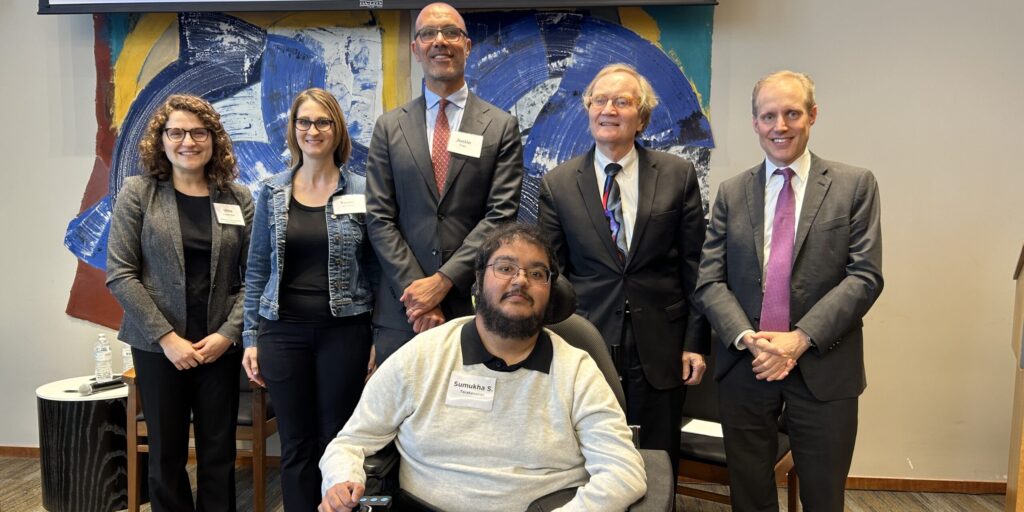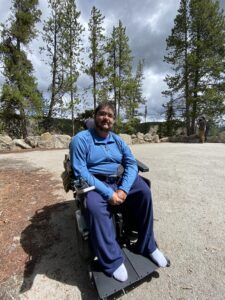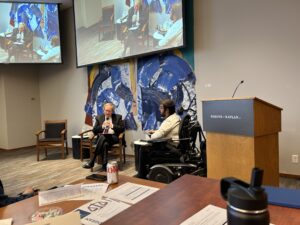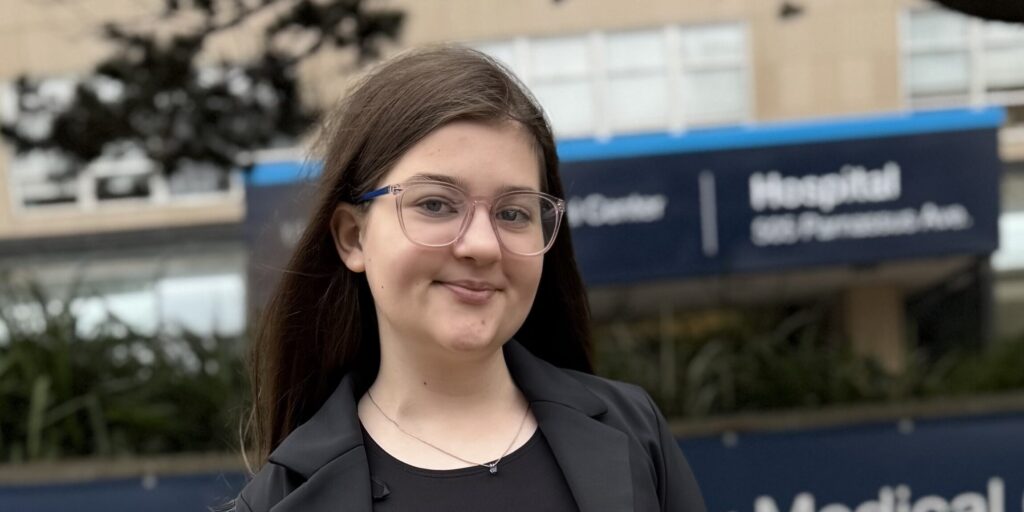
MDA Ambassador Guest Blog: My Experience at the 14th Annual Disability Justice Seminar
By Sumukha Terakanambi | Wednesday, August 14, 2024
5 Second Summary
MDA Ambassadors play an essential role in furthering MDA’s mission while representing and empowering the neuromuscular disease community. Quest Ambassador Guest Blog series provides a platform to share their personal stories, perspectives, and experience.
Sumukha Terakanambi is 25 years old and lives in Lakeville, Minnesota. He was diagnosed with Duchenne muscular dystrophy (DMD) at the age of four. Sumukha is a policy consultant with the Minnesota Council on Disability and the Rare Disease Advisory Council. He also serves on two councils as a self-advocate. In addition to this, he recently started a podcast called the Squeaky Wheel Podcast, to educate the community about disability issues.

Sumukha Terakanambi
In June of 2024, the Robbins Kaplan Law Firm in Minneapolis hosted the 14th Annual Disability Justice Seminar. Over the last 14 years, the Disability Justice Seminar has educated lawyers about disability law to prepare them to take on disability discrimination cases. With the November election just around the corner, the focus of this year’s seminar was voting accessibility for individuals with disabilities. Many distinguished guests who had spent their entire career defending the rights of people with disabilities were the featured speakers. This included the Secretary of State Steve Simon, who oversees voting across the state of Minnesota, the Honorable Judge Donovan Frank, a US District Court Judge, Assistant US Attorney Justin Page, Sarah St. Louis, an ADA coordinator and architect, and Irina Vaynerman, the Deputy Commissioner of the Minnesota Department of Human Rights. As a self-advocate and policy consultant, I was invited to share my lived experiences regarding accessibility in the community and at the polls.
The event started with opening remarks from Secretary Simon, who emphasized the importance of ensuring that people with disabilities can vote however they choose. He made it clear that just because absentee voting (mail-in voting) was an option, it did not mean that polling places could neglect accessibility requirements. He also went on to highlight the many policies that his department has advocated for, to preserve the right to vote for all Minnesotans.

Sumukha Terakanambi during an interview with Judge Frank
I then had the privilege of having an in-depth conversation with Judge Frank about accessibility. In front of a packed room of lawyers and other advocates, I started the conversation by sharing my personal experiences dealing with a lack of accessibility and my advocacy efforts for change. When I was in college, I advocated to improve accessibility across campus. Throughout this ordeal, I felt like the university had not made accessibility a strong enough priority. I underscored that my situation ultimately denied me the same college experience as my peers. Much like education, voting is another fundamental right. Unfortunately, people with disabilities routinely face significant barriers exercising this right. I shared some of my voting experiences with Judge Frank. In a few instances the accessible voting table was not high or wide enough to accommodate my power wheelchair. There were also a few situations where other individuals gave me skeptical looks as my dad was assisting me. It appeared that many individuals were simply not aware that the Voting Rights Act protected my right to choose whomever I wanted to assist me with voting. I also shared some examples where poll workers were eager to provide the necessary assistance and accommodation so I could effectively cast my ballot. These positive experiences illustrate that the dedication of poll workers can make a huge difference for voters with disabilities.
To end our discussion, we briefly touched on the issue of transportation and how this can indirectly present another barrier to voting. I have a wheelchair accessible van and my parents are able to drive me places that I need to go. I recognized that having access to reliable transportation had made a tremendous impact on my ability to vote in the last few elections. Both I and Judge Frank agreed that this was another factor that policymakers and election officials would have to consider when improving access to voting for people with disabilities.
The final item on the agenda for the seminar was a panel discussion about the enforcement of the ADA at voting locations. Many professionals on the panel had direct experience working to ensure that polling places were fully accessible for individuals with disabilities.
For me, the seminar reminded me about the importance of voting. Since the people we elect determine many disability policies, it is crucial for people with disabilities to make their voices heard at the ballot box. Accessibility of voting is vital to achieving this goal of creating a more equitable political process. Given the importance of this issue, I was glad to see the tireless efforts of advocates, lawyers, and elected officials to preserve this fundamental right in our democracy.
I encourage members of the neuromuscular disease community to check out MDA’s Access the Vote campaign, which ensures that people in the neuromuscular disease community understand their voting rights, are registered to vote, and can make plans to vote on election day.
Next Steps and Useful Resources
- Learn more about MDA’s Access the Vote campaign
- For more information about the signs and symptoms of Duchenne muscular dystrophy (DMD), as well an overview of diagnosis and treatment concerns, an in-depth review can be found here.
- To learn more about MDA’s Young Adult Programs, visit here.
- MDA’s Resource Center provides support, guidance, and resources for patients and families. Contact the MDA Resource Center at 1-833-ASK-MDA1 or ResourceCenter@mdausa.org
- Stay up-to-date on Quest content! Subscribe to Quest Magazine and Newsletter.
Disclaimer: No content on this site should ever be used as a substitute for direct medical advice from your doctor or other qualified clinician.




